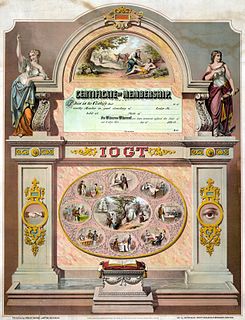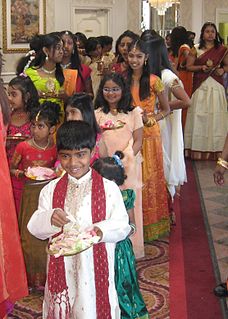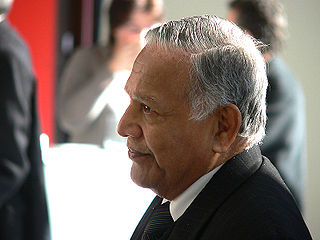
The Liberation Tigers of Tamil Eelam was a Tamil militant organization that was based in northeastern Sri Lanka. Founded in May 1976 by Velupillai Prabhakaran, it waged a secessionist nationalist insurgency to create an independent state of Tamil Eelam in the north and east of Sri Lanka for Tamil people. This campaign led to the Sri Lankan Civil War, which ran from 1983 until 2009, when the LTTE was eventually defeated during the presidency of Mahinda Rajapaksa.

Tourism in Sri Lanka is growing rapidly. For centuries, Sri Lanka has been a popular place of attraction for foreign travelers. The Chinese traveler Fa-Hien visited Sri Lanka as early as the 4th century, and in the twelfth century, Italian explorer Marco Polo claimed Sri Lanka to be the "best island of its size in the world".

The International Organisation of Good Templars, founded as the Independent Order of Good Templars (IOGT), is a fraternal organization describing itself as "the premier global interlocutor for evidence-based policy measures and community-based interventions to prevent and reduce harm caused by alcohol and other drugs". It claims to be the largest worldwide community of non-governmental organisations with a mission to independently enlighten people around the world on a lifestyle free from alcohol and other drugs. The International Organisation of Good Templars is a leading NGO in the temperance movement.
The UNESCO Prize for Peace Education has been awarded annually since 1981. The main goal of UNESCO education price is to encourange excellent effort in the drive to reach a better quality education. The prize is endowed up to 60 000 US dollars and honours extraordinary activities for peace education in the spirit of the UNESCO constitution.

The Supreme Court of Sri Lanka (Tamil: இலங்கை உயர் நீதிமன்றம் Ilankai uyar neetimanram) is the highest court of Sri Lanka. The Supreme Court is the highest and final judicial instance of record and is empowered to exercise its powers, subject to the provisions of the Constitution. The Court has ultimate appellate jurisdiction in constitutional matters, and take precedence over all lower Courts. The Sri Lanka judicial system is complex blend of both common-law and civil-law. In some cases such as capital punishment, the decision may be passed on to the President of the Republic for clemency petitions.

The Tamils Rehabilitation Organisation (TRO) was established in 1985 in Tamil Nadu in southeastern India by Tamil refugees fleeing the violence in North and East Sri Lanka. Its initial operation was to provide relief to the refugees in India. After the signing of the Indo-Sri Lanka Accord and the subsequent fighting between the LTTE and the Indian Peace Keeping Force, TRO moved its operation and headquarters to Jaffna in Northern Sri Lanka.
Sri Lankan Tamil militant groups rose to prominence in the 1970s to fight the state of Sri Lanka in order to create an independent Tamil Eelam in the north of Sri Lanka. They rose in response to the perception among minority Sri Lankan Tamils that the state was preferring the majority Sinhalese for educational opportunities and government jobs. By the end of 1987, the militants had fought not only the Sri Lankan security forces but also the Indian Peace Keeping Force. They also fought among each other briefly, with the main Liberation Tigers of Tamil Eelam (LTTE) rebel group dominating the others. The militants represented inter-generational tensions, as well as the caste and ideological differences. Except for the LTTE, many of the remaining organizations have morphed into minor political parties within the Tamil National Alliance, or as standalone political parties. Some Tamil militant groups also functioned as paramilitaries within the Sri Lankan military against separatist militants.
Sri Lankan-Americans ; are Americans of full or partial Sri Lankan ancestry. Sri Lankan Americans are persons of Sri Lankan origin from various Sri Lankan ethnic backgrounds. The people are classified as South Asian in origin.

Sri Lankan Moors are an ethnic minority group in Sri Lanka, comprising 9.3% of the country's total population. They are mainly native speakers of the Tamil language with influence of Sinhalese and Arabic words. They are predominantly followers of Islam.
Deshamanya is the second-highest national honour of Sri Lanka awarded by the Government of Sri Lanka as a civil honour. It is awarded for "highly meritorious service", and is conventionally used as a title or prefix to the recipient's name.
Militant use of children in Sri Lanka has been an internationally recognized problem since the inception of the Sri Lankan civil war in 1983. The primary recruiters of under the age of 18 children are the rebel LTTE movement and the Karuna group.
The expulsion of non-resident Tamils from Colombo was an incident which took place on June 7, 2007 when 376 ethnic Tamil refugees living in Colombo were deported from the city by the Sri Lankan Police. The evicted were sent back to Jaffna, Vavuniya, Trincomalee and Batticaloa, where they are originally from, in several buses with a police escort. However the buses only went as far as the town of Vavuniya and the evicted Tamils were forced to stay in a detention camp. The President asked those who were evicted to come back to Colombo and ordered an investigation into the incident

Sri Lanka Law College was established as the Ceylon Law College under the Council of Legal Education in 1874 in order to impart a formal legal education to those who wished to be lawyers in Ceylon. The institute is situated at Hulftsdorp Street in Colombo. The Main Building of the College, an impressive pieces of architecture, was constructed in the year 1911. This magnificent building remains a thriving focal point of the Law College.

British Tamils are British people of Tamil origin. The term is used to denote people who have their homeland in Indian state of Tamil Nadu and Sri Lanka.
Asoka Milinda Moragoda is a Sri Lankan politician and businessman. He is a former Cabinet Minister and Member of Parliament representing the Colombo District from 2001 to 2010, who served as the Minister of Justice and Law Reform (2009-2010), Minister of Tourism (2007–2009); Minister for Economic Reform, Science and Technology and Deputy Minister for Plan Implementation and Development (2002–2004). His last political post was that of Opposition Leader of the Colombo Municipal Council and Senior Adviser to former President Mahinda Rajapakse.
British Tamils Forum or BTF, is a largest organisation representing the Tamil Community in the United Kingdom. The BTF intends to be the voice of the Tamil Community in the UK by raising the issues on Tamils in UK and to bring awareness to the issues affecting Tamil people in the island of Sri Lanka and around the world. The BTF's work is focused on addressing the root cause to the conflict through an international justice mechanism to bring truth and justice to all victims of war and to bring end to the entrenched culture of impunity in Sri Lanka.

Tamil Canadians are Canadians of Tamil ethnic origins mostly from Sri Lanka. From a population of fewer than 150 Tamils in 1983, it has become one of the largest visible minority population groups within the Greater Toronto Area. In the 1991 census, Tamils were the fastest-growing ethnic group in the city. Canada's Tamil population is thought to constitute the 2nd largest Sri Lankan diaspora in the world with Toronto being home to the 2nd largest Tamil community outside of Asia.
Poverty in Sri Lanka continues to be a large problem. Sri Lanka's life expectancy and literacy rate are nearly on par with those of developed countries, and even top the rankings for the South Asia region. While all these indicate that Sri Lanka should be experiencing a high standard of living, until recently it has only ranked in the medium category of the Human Development Index (HDI). This is despite the fact that Sri Lanka has been experiencing moderate growth in its GDP averaging 5.5 per annum between 2006 and 2009. One of the reasons is due to its relatively low GDP per capital; currently ranked in the bottom one third of the world. The Sri Lankan government has been successful in reducing poverty from 15.2% on 2006 to 8.9% in 2010, urban poverty was reduced from 6.7 to 5.3% while rural poverty was reduced from 15.7 to 9.5%, and the nation has made significant progress towards achieving Millennium Development Goals on eradicating extreme poverty and hunger.










